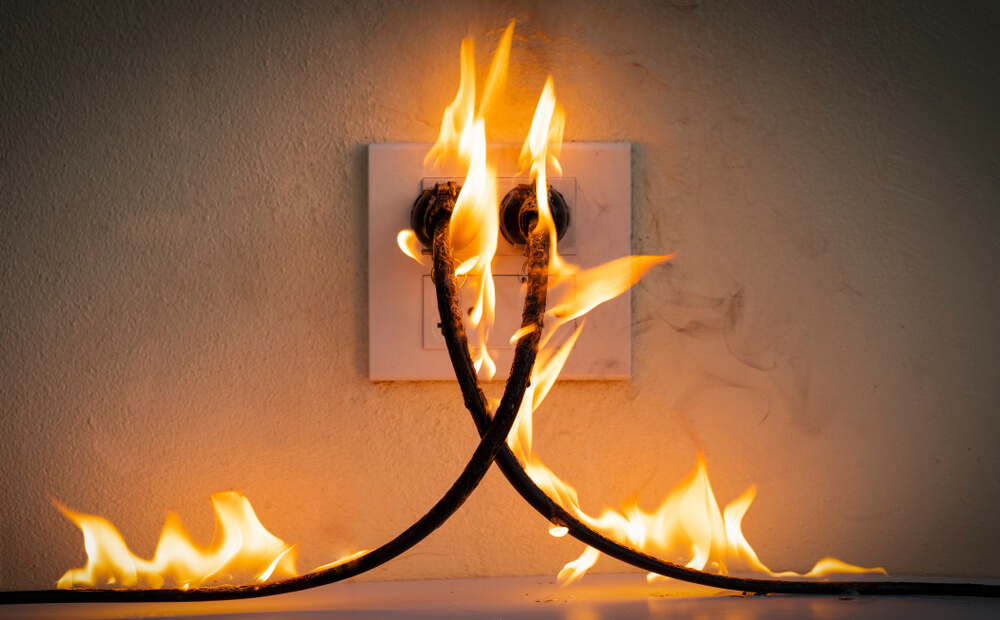Electrical fires are one of the most dangerous hazards in any home or business. They can ignite silently, spread quickly, and cause devastating damage before anyone notices. This guide breaks down what causes electrical fires and how to prevent them, giving you the knowledge to protect your home or workplace before disaster strikes.
Whether you are a homeowner, landlord, or commercial property manager, understanding how electrical fires start and how to prevent them is essential for safety and peace of mind.
This guide breaks down how electrical fires happen, the most common causes, how to prevent them, and what to do if one starts. We also answer some of the most common questions our electricians hear on the Gold Coast.
Quick Fire Risk Checklist
Run through this simple checklist to assess your current risk level:
-
Have you had an electrical inspection in the past five years
-
Do you have powerpoints that spark, feel hot, or are loose
-
Are you relying on multiple extension cords or double adaptors
-
Do your safety switches trip regularly
-
Are you using appliances that are more than ten years old
-
Do you notice burning smells or buzzing near switches
If you answered yes to even one of these questions, you may be at risk and should schedule a safety check.
How Do Electrical Fires Start
Electrical fires begin when heat builds up within an electrical system and ignites nearby materials. This usually happens when electricity is unintentionally converted into heat due to a fault, overload, or arc.
Why this happens:
-
Resistance builds up when something interrupts the flow of electricity, such as damaged wiring or poor connections
-
That resistance produces heat. If heat builds up near timber, insulation, or furniture, it can catch fire
-
Arcing occurs when electricity jumps between gaps in wiring. This creates intense heat and visible sparks
Both heat and arcing are especially dangerous when they happen in hidden places like inside walls or roof cavities.
Common Causes of Electrical Fires
-
Overloaded Power Outlets & Extension Cords
Plugging too many devices into a single outlet or using multiple extension cords can overheat wiring, leading to sparks and potentially a fire. -
Faulty Wiring or Old Electrical Systems
Worn-out, damaged, or improperly installed wiring can create short circuits, overheating, and fire hazards. Homes over 20 years old are particularly at risk if wiring hasn’t been updated. -
Defective Appliances
Malfunctioning appliances—like heaters, toasters, or air conditioners—can overheat or short circuit, igniting nearby flammable materials. -
Damaged Cables & Wires
Chewed, frayed, or pinched cables can expose live wires, creating sparks that may ignite fires. -
Circuit Breaker or Fuse Issues
Circuit breakers and fuses protect your electrical system. Faulty or bypassed breakers can allow excessive current to flow, overheating wiring. -
Poor Maintenance of Electrical Equipment
Lack of routine checks on switches, plugs, outlets, and appliances increases the risk of unnoticed electrical faults. -
Water Exposure
Electricity and water don’t mix. Damp environments, leaks, or flooding around electrical devices can trigger fires or shocks.
How to Prevent Electrical Fires
You can dramatically reduce the risk of fire by taking a few smart precautions.
Book regular inspections
Have your wiring, switchboard, outlets, and appliances inspected by a licensed electrician every five years. A professional electrician can identify potential hazards before they become dangerous, including overloaded circuits or outdated switchboards.
Upgrade your switchboard
Modern switchboards include residual current devices that shut off power the moment a fault is detected
Do not overload circuits
Spread your electrical load across different outlets and avoid stacking adaptors or boards
Tag and test
In rental or commercial settings, appliances should be tested and tagged at regular intervals
Install smoke alarms and Safety. Devices.
Install smoke alarms and Safety Devices in every bedroom and hallway. Consider arc-fault circuit interrupters (AFCIs) for added protection.
Follow appliance instructions
Only use appliances for their intended purpose and do not leave them running unattended for long period. Don’t forget to unplug and repair or replace appliances that overheat, spark, or emit strange smells.
Protect wet areas
Use weatherproof powerpoints in bathrooms, kitchens, and outdoor areas. Ensure outlets, cords, and appliances are dry. Never touch devices with wet hands.
What to Do in an Electrical Fire
If you see smoke or flames coming from an electrical source, act quickly and carefully.
Step-by-step guide:
-
Alert everyone in the property and call 000 immediately
-
If safe, unplug the appliance or switch off power at the main board
-
Use a fire blanket to smother small fires
-
Use a Class E extinguisher only if trained and the fire is contained
-
If there is smoke or the fire spreads, evacuate immediately
Important
Never pour water on an electrical fire. Water conducts electricity and may cause electric shock or injury.
Which Fire Extinguisher Should You Use
Only use a Class E extinguisher which contains carbon dioxide. This type removes oxygen from the area around the fire and does not leave any residue.
Avoid using:
-
Water extinguishers
-
Foam extinguishers
-
Dry powder (unless trained, as this may damage electronics)
Keep a small carbon dioxide extinguisher and a fire blanket in key areas such as the kitchen or garage.
Frequently Asked Questions
Flickering lights, sparking outlets, burning smells, buzzing sounds, and frequent trips on your switchboard
Yes. Homes built before 2000 may have outdated wiring or switchboards that lack safety features
Absolutely. Frayed, pinched, or chewed wires can expose live electricity, creating sparks that may ignite nearby materials.
Only if the electrical work was performed legally and safely. DIY work may void your policy
Only if it is small and you are trained. Otherwise, evacuate and let the fire brigade handle it
Yes. Smoke alarms, heat detectors, and arc-fault circuit interrupters (AFCIs) help prevent fires by detecting abnormal electrical activity early.
Book an Electrical Safety Inspection Today
Preventing an electrical fire starts with a professional check. Oceanside Services offers full safety inspections, switchboard upgrades, smoke alarm installations, and 24/7 emergency repairs.
- Fully licensed electricians (QLD Licence 85210)
- Local to the Gold Coast and trusted across Queensland
- Same-day emergency service available
Call 07 5391 3580 or book online today to protect your property and family



 5 Star Service
5 Star Service 




